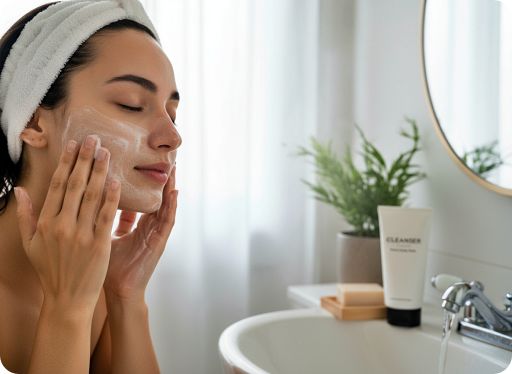Daily Skincare Routine Steps That Actually Work — For Every Skin Type
Having a consistent skincare routine isn’t about luxury — it’s about healthy, radiantand balanced skin. The key to achieving this glow lies in understanding your unique skin type and building a routine that works for it. Whether you have dry, oily, combination or sensitive skin, the right steps and products can make all the difference.
Note: This Page was last updated on Sunday 28th of December 2025

In this guide, we’ll explore a complete skincare routine that works for all skin types — from morning freshness to nighttime repair — and how you can tailor each step to your skin’s specific needs.
Understanding Your Skin Type
Before you start layering products, it’s essential to know what kind of skin you have:
- Dry Skin: Often feels tight, rough or flaky. Lacks natural oils and needs deep hydration.
- Oily Skin: Shiny, especially in the T-zone (forehead, nose, chin). Prone to enlarged pores and breakouts.
- Combination Skin: Oily in some areas (usually the T-zone) but dry in others (cheeks or around the mouth).
- Sensitive Skin: Easily irritated, can react to fragrances or harsh ingredients. Needs gentle, calming formulas.
- Normal Skin: Balanced and low maintenance — not too oily, not too dry.
Knowing your type helps you choose the right textures, ingredients and frequency of application.
Morning Routine: Protect and Prepare
Morning skincare is all about protection and prevention. You’re prepping your skin to face pollution, UV rays and environmental stress.
Step 1: Gentle Cleanser
Start your day with a mild cleanser that removes oil and sweat without stripping your skin.
- Dry or sensitive skin? Opt for a creamy, hydrating formula.
- Oily or combination skin? A gel or foaming cleanser works best to remove excess sebum.
Step 2: Toner
Toners rebalance your skin’s pH and refresh it before applying heavier products. Choose alcohol-free options to avoid drying out the skin.

Step 3: Serum
Morning serums are your secret weapon.
- Use a Vitamin C serum to brighten and protect against UV damage.
- For dry or sensitive skin, choose hyaluronic acid for deep hydration.
Step 4: Moisturizer
Even oily skin needs moisturizer — skipping it can trigger more oil production.
- Dry skin: Rich, creamy moisturizers.
- Oily skin: Lightweight, gel-based formulas.
Step 5: Sunscreen (SPF 30 or higher)
Never skip this step. Sunscreen is the ultimate anti-aging product, protecting against wrinkles, spots and long-term damage. Reapply every few hours if you’re outdoors.
Evening Routine: Cleanse and Restore
The evening is the perfect time to remove buildup and restore skin health after a long day.
Step 1: Makeup Remover / Double Cleanse
If you wear makeup or sunscreen, start with a gentle oil-based cleanser or micellar water, then follow with your regular cleanser. This ensures your skin is clean without over-drying.
Step 2: Toner or Essence
Hydrating toners or essences help prep your skin for the active ingredients that come next. Look for ones containing niacinamide or rose water for soothing effects.
Step 3: Treatment or Serum
This is where you target specific concerns like fine lines, dark spots or dullness.
Anti-aging: Retinol or peptides
Acne-prone: Niacinamide or salicylic acid
Dry skin: Hyaluronic acid or ceramides
Step 4: Moisturizer or Night Cream
Nighttime moisturizers are usually richer. They seal in hydration and support overnight repair. If you’re using retinol, follow it with a nourishing cream to minimize dryness.
Night Routine: Deep Repair and Renewal
Nighttime (before bed) is when your skin goes into repair mode. This is the best moment to use products with active ingredients.
Step 1: Overnight Serum or Mask
After cleansing, apply an overnight treatment that targets your main concern — such as a firming mask, anti-aging serum or hydrating sleeping mask.
Step 2: Eye Cream
The delicate under-eye area needs extra care. Use a peptide-based or caffeine-infused eye cream to reduce puffiness and fine lines.
Step 3: Lip Balm
Hydrate your lips overnight to wake up with a soft, smooth feel.
Related: Steps for a Skincare Routine: A Complete Daily Guide
How to Customize Your Routine by Skin Type
Every skin type has its own needs. Here’s how to tailor your steps effectively:
For Dry Skin
- Use hydrating cleansers and rich creams with ceramides or shea butter.
- Layer with a hyaluronic acid serum and seal with a nourishing night cream.
- Avoid alcohol-based toners.
For Oily Skin
- Go for lightweight, gel-based products that control shine.
- Use salicylic acid or niacinamide to minimize pores.
- Don’t skip moisturizer — dehydration increases oil production.
For Sensitive Skin
- Keep it minimal: gentle cleanser, calming toner, fragrance-free moisturizer.
- Look for soothing ingredients like aloe vera, oat extract and panthenol.
- Avoid strong acids and exfoliants more than once a week.
For Combination Skin
- Use a gel cleanser to balance oil and hydration.
- Apply lightweight moisturizer to the T-zone, richer cream on dry areas.
- Multi-masking (different masks for oily and dry zones) can help maintain balance.
Common Skincare Mistakes to Avoid
Even the best routines can fail if you make these common errors:
- Over-exfoliating — causes sensitivity and breakouts.
- Skipping sunscreen — the fastest way to premature aging.
- Using too many actives at once — leads to irritation and imbalance.
- Sleeping with makeup — clogs pores and accelerates skin aging.
Related: The Most Effective Skincare Product Comparison (Reviews)
Final Thoughts
Skincare isn’t about perfection — it’s about consistency and understanding what your skin truly needs. Start simple, stay consistent and make small adjustments as your skin evolves.
Whether it’s fighting dryness, managing oil or slowing down the signs of aging, your perfect routine starts here. Take the time to care for your skin today — your future self will thank you.
Related: Best Skincare Products for Every Skin Type
Frequently Asked Questions
1. How often should I exfoliate?
Most skin types benefit from exfoliating 1–2 times a week. Oily skin may tolerate more frequent exfoliation, while sensitive skin should limit it.
2. What’s the best order to apply skincare products?
Always go from lightest to heaviest texture: cleanser → toner → serum → moisturizer → sunscreen.
3. Can I use the same routine day and night?
Morning focuses on protection (antioxidants, SPF), while night focuses on repair (retinol, peptides or rich creams). So it’s best to adapt slightly.
4. Do I really need toner?
Not always — but for oily or acne-prone skin, toners can help balance oil and prep your skin for treatment.
5. Should I change my skincare routine with the seasons?
Yes. In colder months, switch to richer moisturizers and hydrating products. During summer, opt for lighter textures and focus on oil control and sun protection.
6. How long does it take to see visible results?
Most people notice improvements in 4–6 weeks of consistent use, since skin cells renew roughly every 28 days. Patience and consistency are key.
7. Is it okay to mix different skincare brands?
Absolutely. The effectiveness depends on ingredients, not brand labels. Just avoid layering multiple strong actives (like retinol and acids) at the same time.
8. Do I need separate products for my face and neck?
Not necessarily — most facial products can be extended down to your neck. However, don’t forget to apply SPF there too; it’s one of the first areas to show aging.
9. Can I skip moisturizer if I have oily skin?
No. Even oily skin needs hydration. Choose oil-free, lightweight moisturizers with ingredients like hyaluronic acid or glycerin.
10. How can I reduce large pores?
Use products with niacinamide or salicylic acid, cleanse regularly and always remove makeup before bed. Avoid harsh scrubs — they can enlarge pores over time.
11. What should I do if a product irritates my skin?
Stop using it immediately and simplify your routine. Reintroduce products one by one to identify the cause. Always patch test new items before applying them to your full face.
Discover more skincare guides and find your perfect routine at SkincareFav.com



